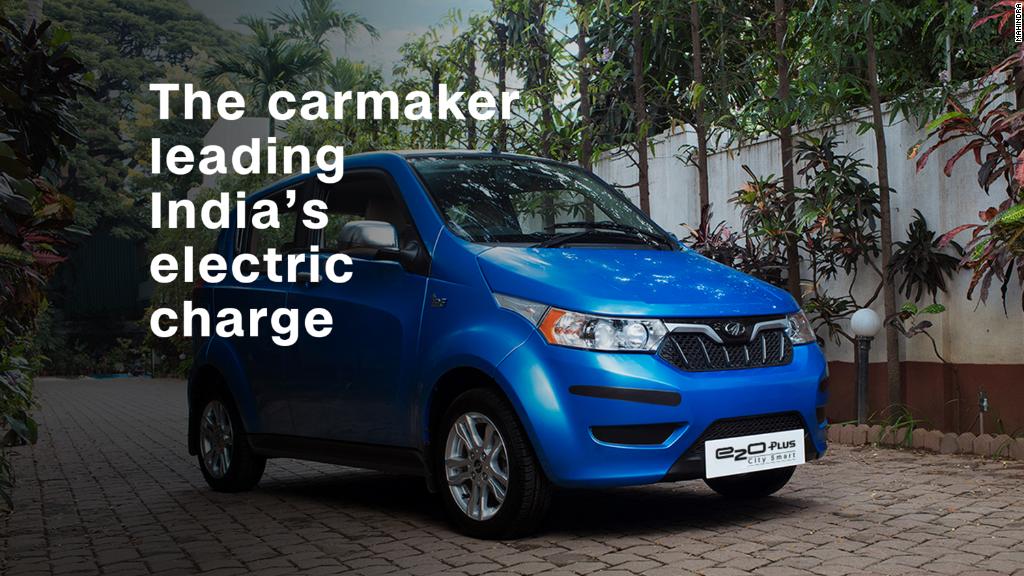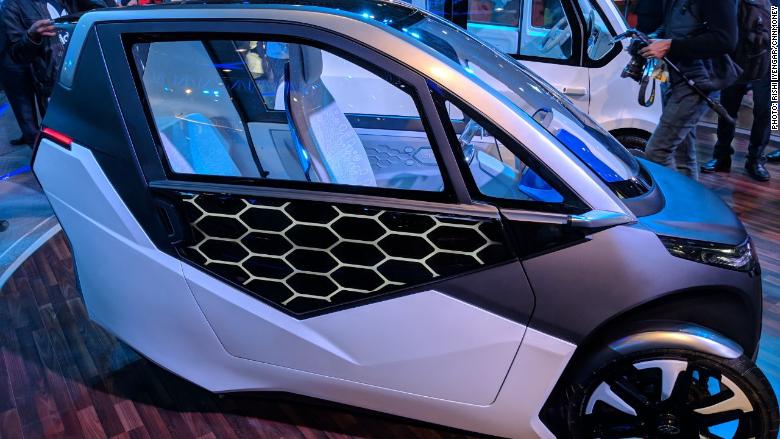
India's ambitious goal of removing gas-powered vehicles from its roads by 2030 has automakers revving up.
Nearly all the companies at the country's biennial Auto Expo, which opens Friday, have at least one electric vehicle on display. Some, such as Mahindra & Mahindra (MAHMF) and Tata (TTM), have several -- including an electric bus each.
Maruti Suzuki, the country's top carmaker with nearly half the market, unveiled an electric car concept, as did big international brands like Hyundai (HYMTF), Honda (HMC), Toyota (TM) and Daimler's (DMLRY) Mercedes-Benz.
Maruti Suzuki is also building a plant to manufacture lithium ion batteries along with Japanese electronics firm Toshiba (TOSBF) and auto parts manufacturer Denso (DNZOF). It should be operational by 2020.
South Korea's Kia Motors, which is expecting to open a $1 billion Indian manufacturing plant in 2019, announced plans for an "India-exclusive" electric vehicle.
"Battery-operated vehicles are becoming an option, a serious option," said Sugato Sen, deputy director general of the Society of Indian Automobile Manufacturers. "The Indian government has expressed its desire to move in that direction," he told CNN at the Auto Expo near New Delhi.
Longer range electric vehicles and lower battery costs are helping them gain more momentum among consumers, Sen added.
"All these put together, by 2030, the aspiration that we are talking about may not be very far," he said.
It's not just cars. Motorcycle and scooter manufacturers unveiled more than a dozen electric models at the show. India is the world's largest market for two wheels, with over 17 million bikes sold in the year ending March 2017.
Related: India wants to sell only electric vehicles by 2030
Unreliable power and few chargers
But India's creaking infrastructure could make for a bumpy road ahead.
Electricity supply isn't always reliable -- or even available -- and charging stations are still few and far between.
"That, perhaps, is the biggest gap before electric vehicles can take off," Pawan Goenka, managing director of Mahindra & Mahindra, told CNN.

Carmakers want to see more action from the government.
"The transformation to electric cars is inevitable in India," said Sumit Sawhney, who heads Renault's (RNLSY) Indian business. Renault claims to sell 25% of all electric vehicles in Europe, but it has yet to launch one in India.
"It is time for the government to put in place a clear policy, time-frame and the necessary infrastructure to enable [companies] to be adequately prepared," he added.
Tata Motors, which had over half a dozen electric vehicles on display but currently only sells them to government and commercial clients, echoed his sentiment.
Government help needed
"The government needs to jointly develop this industry," CEO Guenter Butschek told reporters. "And it's not just automotive -- it's also relevant to the companies which will provide the infrastructure for the ecosystem, [they] need to come together with us," he added.
Related: 2018 will be the year of the electric car
The combination of hurdles means that electric vehicles are still a drop in the ocean for India's automotive market, currently the world's fifth largest and forecast to become the third biggest -- behind the U.S. and China -- by 2020.
Mahindra & Mahindra is the only company in India currently selling electric cars directly to consumers, but Goenka expect others will join the party soon.
"When there are more players, more choices, the segment itself will grow," he said.
"To put 1,000 charging points in a city is not something that is unaffordable for the government. For $5 million you can cover a city like Delhi," he added.
-- Nikhil Kumar and Sugam Pokharel contributed to this story

